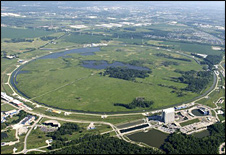The race for the "bit of God" is on fire!

The European science laboratory Cern , which studies particles and is known as the parent of the Large Hadron Collider, is rapidly losing its chances of becoming the first to prove the existence of the Higgs boson or the “particle of God” - states its competitor from the USA Fermilab .
The particle, the existence of which was proposed theoretically, should help scientists explain why matter has mass. To prove this theory practically, and the LHC was built.
Fermilab claims that the chances of success with their Tevatron accelerator (similar to BAK) range from 50% at worst to 96% at best. Like the LHC, this accelerator was built to reveal an elementary particle, known as the “particle of God”, pushing atoms at high speeds. If a particle exists, it should be among the fragments after the collision.
It is worth noting that the LHC failed in September of last year due to the damage of one of the magnets constituting a huge ring. Project leader Lin Evans (Lyn Evans) notes that a forced delay in the work may cost the laboratory a grand prize in the world of physics.

The incident with one of the magnets threw Cern far back.
Big races
The definition of the so-called Particle of God for Cern has been the goal since the early 1980s, when the idea of the Large Hadron Collider first appeared. When it was first launched in September last year, some scientists assumed that the particle would be proven by summer 2009, but only a week later an accident occurred that delayed the experiments until next summer.
')
The American laboratory Fermilab gained an advantage, and is now at an accelerated pace conducting experiments in its Tevatron accelerator in Illinois. Dr. Dmitry Denisov says: “Now we have very, very good chances to find the manifestation of a boson before it does the BAK.” “The probability that a boson is in the high mass range is 90%, which increases our chances of success. The maximum chance is 96% - if its mass is 170 GeV (giga-electron volt) - and in this case we will have all the necessary information by this summer. ”
The amount of information increases very quickly. And Cern feels the tension.
Dmitry Denisov, Fermilab .
Treasure hunt
 The smaller the particle mass, the harder it will be for Fermilab to find it. However, even if the mass is at the end of the lower mass range, there still remains a chance of 50% that it will be found.
The smaller the particle mass, the harder it will be for Fermilab to find it. However, even if the mass is at the end of the lower mass range, there still remains a chance of 50% that it will be found.Now the accelerator works just fine, notes Dr. Denisov. “This is a race: who is first, that first,” he says.
Fermilab also stated that the accelerator had already processed eight collision results, which may contain the Higgs boson. However, until all the collisions are held, it cannot be argued that this is evidence, and not just outside information.
Standoff
At the conference on the Higgs boson, Dr. Denisov noted:
The race has begun. Tevatron works better than we could have imagined; it collects information just like crazy.
The accident at the LHC gave them (Sern) extra time, which they certainly use to the maximum.
His opponent from Cern, Professor Lin Evans says:
If they really find a particle, I can only wish them luck. But it seems to me unreal before the BAC works again. Perhaps they will find manifestations of the boson, but they will not be able to prove its existence. And of course, if the particle is not in the mass range in which they believe, they have no chance at all, although they say about 50%.
It is also worth noting that the LHC can be used in the future for other purposes, when their accelerator was built only to detect particles.
via news.bbc.co.uk/1/hi/sci/tech/7893689.stm
Source: https://habr.com/ru/post/52220/
All Articles